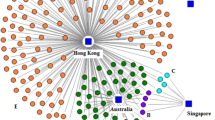Abstract
To consider different aspects of life when measuring human development, the United Nations Development Program introduced the Human Development Index (HDI). The HDI is a composite index of socioeconomic indicators that reflect three major dimensions of human development: longevity, knowledge and standard of living. In this paper, the assessment of the HDI is reconsidered in the light of data envelopment analysis (DEA). Instead of a simple rank of the countries, human development is benchmarked on the basis of empirical observations of best practice countries. First, on the same line as HDI, we develop a DEA-like model to assess the relative performance of the countries in human development. Then we extend our calculations with a post-DEA model to derive global estimates of a new development index by using common weights for the socioeconomic indicators. Finally, we introduce the transformation paradigm in the assessment of human development. We develop a DEA model to estimate the relative efficiency of the countries in converting income to knowledge and life opportunities.




Similar content being viewed by others
References
Hicks N and Streeten P (1979). Indicators of development: the search for a basic needs yardstic. World Dev 7: 567–580.
Streeten P et al. (1981). First Things First: Meeting Basic Needs in Developing Countries. Oxford University Press: New York.
UNDP (2000). Human Development Report 2000. United Nations Development Program, Oxford University Press: New York.
Noorbakhsh F (1998). A modified Human Development Index. World Dev 26: 517–528.
Sagar AD and Najam A (1998). The human development index: a critical review. Ecol Econ 25: 249–264.
Neumayer E (2001). The human development index — a constructive proposal. Ecol Econ 39: 101–114.
Desai M (1991). Human development: concepts and measurement. Eur Econ Rev 35: 350–357.
Kelly AC (1991). The human development index: ‘handle with care’. Population Dev Rev 17: 315–324.
Mahlberg B and Obersteiner M (2001). Remeasuring the HDI by data envelopment analysis. International Institute for Applied Systems Analysis (IIASA), Interim Report IR-01-069, Laxemburg, Austria.
Charnes A, Cooper WW and Rhodes E (1978). Measuring the efficiency of decision making units. Eur J Opl Res 2: 429–444.
Banker RD, Charnes A and Cooper WW (1984). Some models for estimating technical and scale inefficiencies in data envelopment analysis. Mngt Sci 30: 1078–1092.
Cooper WW, Seiford LM and Tone K (1999). Data Envelopment Analysis. Kluwer Academic Publishers: Boston.
Raab R, Kotamraju P and Haag S (2000). Efficient provision of child quality of life in less developed countries: conventional development indexes versus a programming approach to development indexes. Socio-Econ Plann Sci 34: 51–67.
Revilla E, Sarkis J and Modrego A (2003). Evaluating performance of public–private research collaborations: a DEA analysis. J Opl Res Soc 54: 165–174.
Mayston DJ (2003). Measuring and managing educational performance. J Opl Res Soc 54: 679–691.
Mukherjee A, Nath P and Pal M (2003). Resource, service quality and performance triad: a framework for measuring efficiency of banking services. J Opl Res Soc 54: 723–735.
Bowlin WF, Renner CJ and Rives JM (2003). A DEA study of gender equity in executive compensation. J Opl Res Soc 54: 751–757.
Shao BBM and Shu WS (2004). Productivity breakdown of the information and computing technology industries across countries. J Opl Res Soc 55: 23–33.
Despotis DK (2004). Measuring human development via data envelopment analysis: The case of Asia and The Pacific. Omega. Int J Mngt Sci (in press).
Despotis DK (2002). Improving the discriminating power of DEA: focus on globally efficient units. J Opl Res Soc 53: 314–323.
Author information
Authors and Affiliations
Corresponding author
Appendix
Appendix
Results obtained by the index-maximizing model and the transformation approach: top 20 countries in the HDI rank plus the intra-group efficient countries
Rights and permissions
About this article
Cite this article
Despotis, D. A reassessment of the human development index via data envelopment analysis. J Oper Res Soc 56, 969–980 (2005). https://doi.org/10.1057/palgrave.jors.2601927
Received:
Accepted:
Published:
Issue Date:
DOI: https://doi.org/10.1057/palgrave.jors.2601927




